Online Privacy: An Analytical Essay for NIT2201, May 2019
VerifiedAdded on 2023/03/17
|9
|2272
|76
Essay
AI Summary
This essay delves into the critical aspects of online privacy, emphasizing its significance in protecting individuals and groups from external threats in the digital realm. It explores digital privacy, highlighting the importance of safeguarding user data and ensuring trust within online platforms. The essay discusses various issues related to digital materials, such as document piracy and data theft, while also examining effective methods for ensuring digital privacy. It analyzes the digital protection measures implemented by major platforms like Facebook, Google, and iCloud, while addressing the varying levels of privacy needed by different users and advocating for new laws to protect user data. The essay compares the privacy laws of Europe (GDPR) and Australia (Australian Privacy Act 1988), concluding with a call for continued vigilance and proactive measures to safeguard online privacy. The essay references several academic sources to support its arguments.

Running head: ONLINE PRIVACY
Online Privacy
Name of the Student
Name of the University
Author Note
Online Privacy
Name of the Student
Name of the University
Author Note
Paraphrase This Document
Need a fresh take? Get an instant paraphrase of this document with our AI Paraphraser
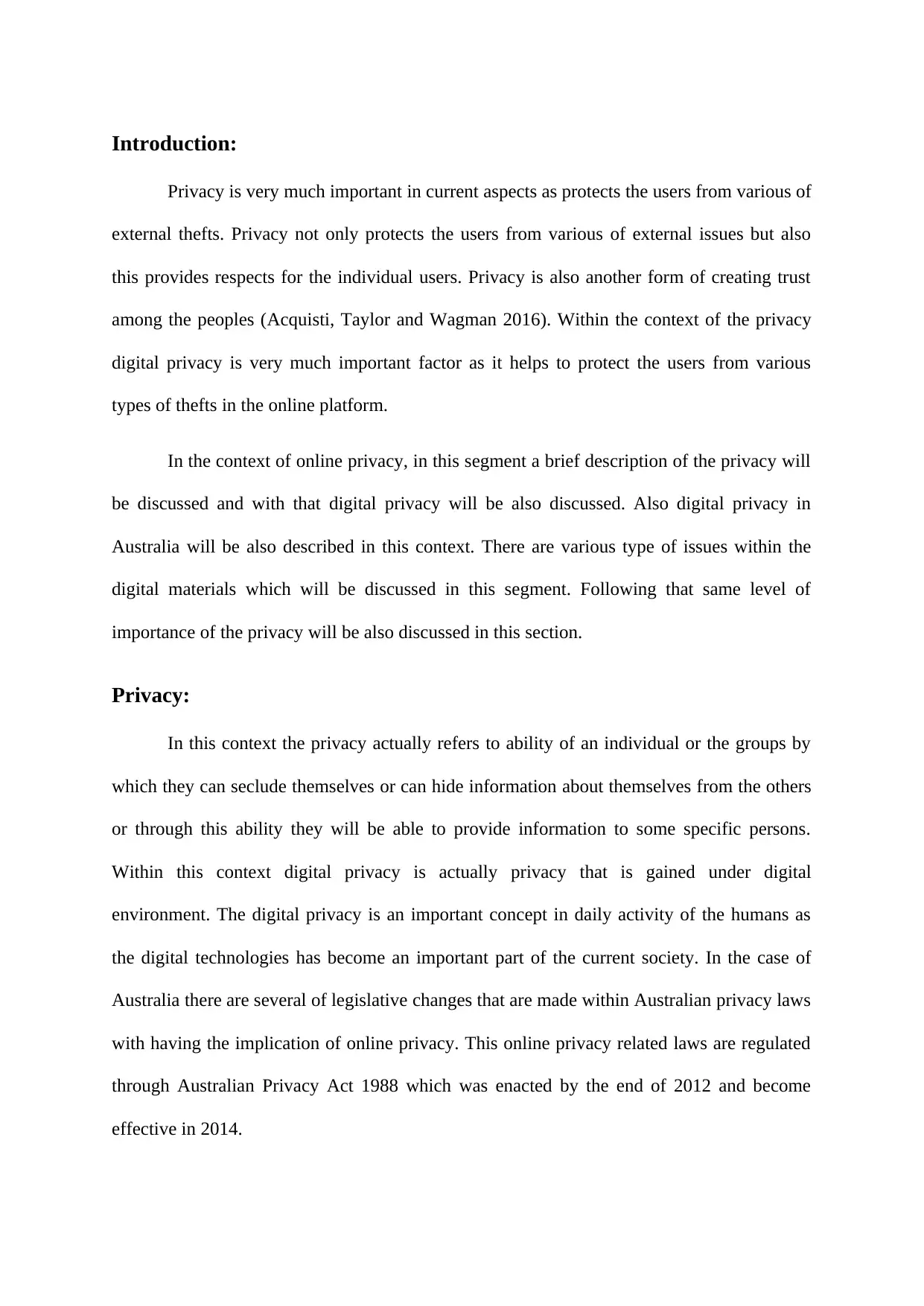
Introduction:
Privacy is very much important in current aspects as protects the users from various of
external thefts. Privacy not only protects the users from various of external issues but also
this provides respects for the individual users. Privacy is also another form of creating trust
among the peoples (Acquisti, Taylor and Wagman 2016). Within the context of the privacy
digital privacy is very much important factor as it helps to protect the users from various
types of thefts in the online platform.
In the context of online privacy, in this segment a brief description of the privacy will
be discussed and with that digital privacy will be also discussed. Also digital privacy in
Australia will be also described in this context. There are various type of issues within the
digital materials which will be discussed in this segment. Following that same level of
importance of the privacy will be also discussed in this section.
Privacy:
In this context the privacy actually refers to ability of an individual or the groups by
which they can seclude themselves or can hide information about themselves from the others
or through this ability they will be able to provide information to some specific persons.
Within this context digital privacy is actually privacy that is gained under digital
environment. The digital privacy is an important concept in daily activity of the humans as
the digital technologies has become an important part of the current society. In the case of
Australia there are several of legislative changes that are made within Australian privacy laws
with having the implication of online privacy. This online privacy related laws are regulated
through Australian Privacy Act 1988 which was enacted by the end of 2012 and become
effective in 2014.
Privacy is very much important in current aspects as protects the users from various of
external thefts. Privacy not only protects the users from various of external issues but also
this provides respects for the individual users. Privacy is also another form of creating trust
among the peoples (Acquisti, Taylor and Wagman 2016). Within the context of the privacy
digital privacy is very much important factor as it helps to protect the users from various
types of thefts in the online platform.
In the context of online privacy, in this segment a brief description of the privacy will
be discussed and with that digital privacy will be also discussed. Also digital privacy in
Australia will be also described in this context. There are various type of issues within the
digital materials which will be discussed in this segment. Following that same level of
importance of the privacy will be also discussed in this section.
Privacy:
In this context the privacy actually refers to ability of an individual or the groups by
which they can seclude themselves or can hide information about themselves from the others
or through this ability they will be able to provide information to some specific persons.
Within this context digital privacy is actually privacy that is gained under digital
environment. The digital privacy is an important concept in daily activity of the humans as
the digital technologies has become an important part of the current society. In the case of
Australia there are several of legislative changes that are made within Australian privacy laws
with having the implication of online privacy. This online privacy related laws are regulated
through Australian Privacy Act 1988 which was enacted by the end of 2012 and become
effective in 2014.
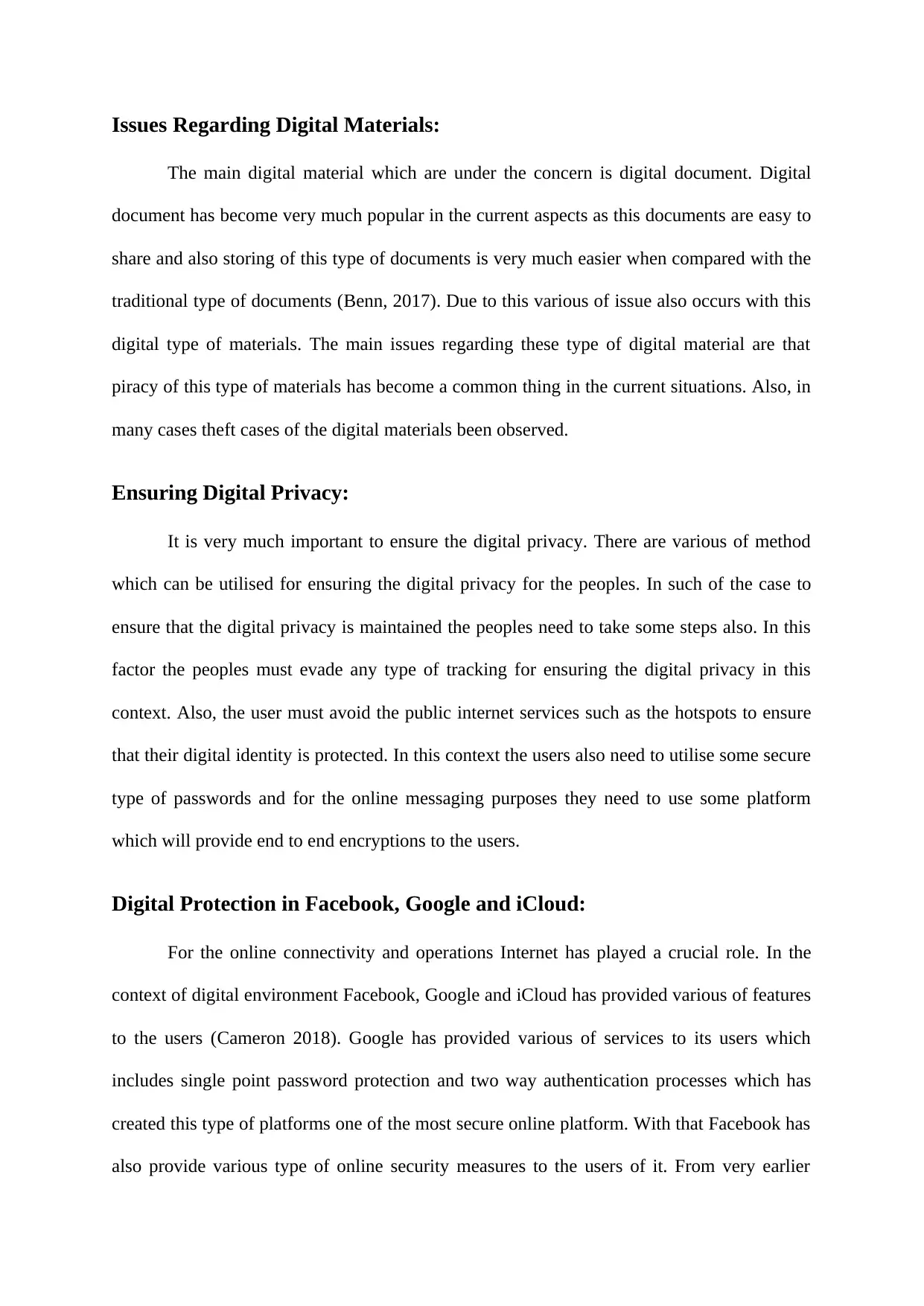
Issues Regarding Digital Materials:
The main digital material which are under the concern is digital document. Digital
document has become very much popular in the current aspects as this documents are easy to
share and also storing of this type of documents is very much easier when compared with the
traditional type of documents (Benn, 2017). Due to this various of issue also occurs with this
digital type of materials. The main issues regarding these type of digital material are that
piracy of this type of materials has become a common thing in the current situations. Also, in
many cases theft cases of the digital materials been observed.
Ensuring Digital Privacy:
It is very much important to ensure the digital privacy. There are various of method
which can be utilised for ensuring the digital privacy for the peoples. In such of the case to
ensure that the digital privacy is maintained the peoples need to take some steps also. In this
factor the peoples must evade any type of tracking for ensuring the digital privacy in this
context. Also, the user must avoid the public internet services such as the hotspots to ensure
that their digital identity is protected. In this context the users also need to utilise some secure
type of passwords and for the online messaging purposes they need to use some platform
which will provide end to end encryptions to the users.
Digital Protection in Facebook, Google and iCloud:
For the online connectivity and operations Internet has played a crucial role. In the
context of digital environment Facebook, Google and iCloud has provided various of features
to the users (Cameron 2018). Google has provided various of services to its users which
includes single point password protection and two way authentication processes which has
created this type of platforms one of the most secure online platform. With that Facebook has
also provide various type of online security measures to the users of it. From very earlier
The main digital material which are under the concern is digital document. Digital
document has become very much popular in the current aspects as this documents are easy to
share and also storing of this type of documents is very much easier when compared with the
traditional type of documents (Benn, 2017). Due to this various of issue also occurs with this
digital type of materials. The main issues regarding these type of digital material are that
piracy of this type of materials has become a common thing in the current situations. Also, in
many cases theft cases of the digital materials been observed.
Ensuring Digital Privacy:
It is very much important to ensure the digital privacy. There are various of method
which can be utilised for ensuring the digital privacy for the peoples. In such of the case to
ensure that the digital privacy is maintained the peoples need to take some steps also. In this
factor the peoples must evade any type of tracking for ensuring the digital privacy in this
context. Also, the user must avoid the public internet services such as the hotspots to ensure
that their digital identity is protected. In this context the users also need to utilise some secure
type of passwords and for the online messaging purposes they need to use some platform
which will provide end to end encryptions to the users.
Digital Protection in Facebook, Google and iCloud:
For the online connectivity and operations Internet has played a crucial role. In the
context of digital environment Facebook, Google and iCloud has provided various of features
to the users (Cameron 2018). Google has provided various of services to its users which
includes single point password protection and two way authentication processes which has
created this type of platforms one of the most secure online platform. With that Facebook has
also provide various type of online security measures to the users of it. From very earlier
⊘ This is a preview!⊘
Do you want full access?
Subscribe today to unlock all pages.

Trusted by 1+ million students worldwide
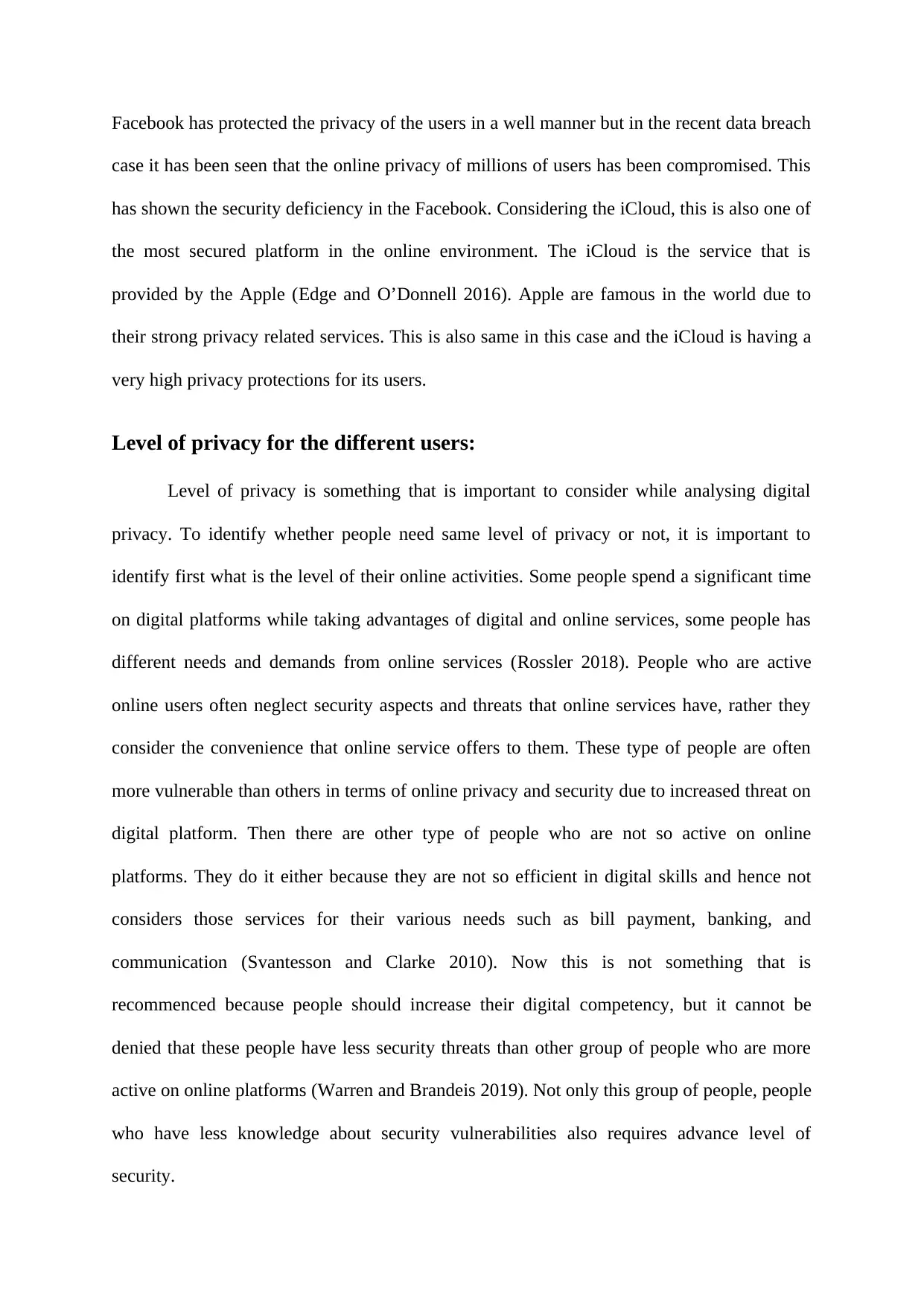
Facebook has protected the privacy of the users in a well manner but in the recent data breach
case it has been seen that the online privacy of millions of users has been compromised. This
has shown the security deficiency in the Facebook. Considering the iCloud, this is also one of
the most secured platform in the online environment. The iCloud is the service that is
provided by the Apple (Edge and O’Donnell 2016). Apple are famous in the world due to
their strong privacy related services. This is also same in this case and the iCloud is having a
very high privacy protections for its users.
Level of privacy for the different users:
Level of privacy is something that is important to consider while analysing digital
privacy. To identify whether people need same level of privacy or not, it is important to
identify first what is the level of their online activities. Some people spend a significant time
on digital platforms while taking advantages of digital and online services, some people has
different needs and demands from online services (Rossler 2018). People who are active
online users often neglect security aspects and threats that online services have, rather they
consider the convenience that online service offers to them. These type of people are often
more vulnerable than others in terms of online privacy and security due to increased threat on
digital platform. Then there are other type of people who are not so active on online
platforms. They do it either because they are not so efficient in digital skills and hence not
considers those services for their various needs such as bill payment, banking, and
communication (Svantesson and Clarke 2010). Now this is not something that is
recommenced because people should increase their digital competency, but it cannot be
denied that these people have less security threats than other group of people who are more
active on online platforms (Warren and Brandeis 2019). Not only this group of people, people
who have less knowledge about security vulnerabilities also requires advance level of
security.
case it has been seen that the online privacy of millions of users has been compromised. This
has shown the security deficiency in the Facebook. Considering the iCloud, this is also one of
the most secured platform in the online environment. The iCloud is the service that is
provided by the Apple (Edge and O’Donnell 2016). Apple are famous in the world due to
their strong privacy related services. This is also same in this case and the iCloud is having a
very high privacy protections for its users.
Level of privacy for the different users:
Level of privacy is something that is important to consider while analysing digital
privacy. To identify whether people need same level of privacy or not, it is important to
identify first what is the level of their online activities. Some people spend a significant time
on digital platforms while taking advantages of digital and online services, some people has
different needs and demands from online services (Rossler 2018). People who are active
online users often neglect security aspects and threats that online services have, rather they
consider the convenience that online service offers to them. These type of people are often
more vulnerable than others in terms of online privacy and security due to increased threat on
digital platform. Then there are other type of people who are not so active on online
platforms. They do it either because they are not so efficient in digital skills and hence not
considers those services for their various needs such as bill payment, banking, and
communication (Svantesson and Clarke 2010). Now this is not something that is
recommenced because people should increase their digital competency, but it cannot be
denied that these people have less security threats than other group of people who are more
active on online platforms (Warren and Brandeis 2019). Not only this group of people, people
who have less knowledge about security vulnerabilities also requires advance level of
security.
Paraphrase This Document
Need a fresh take? Get an instant paraphrase of this document with our AI Paraphraser
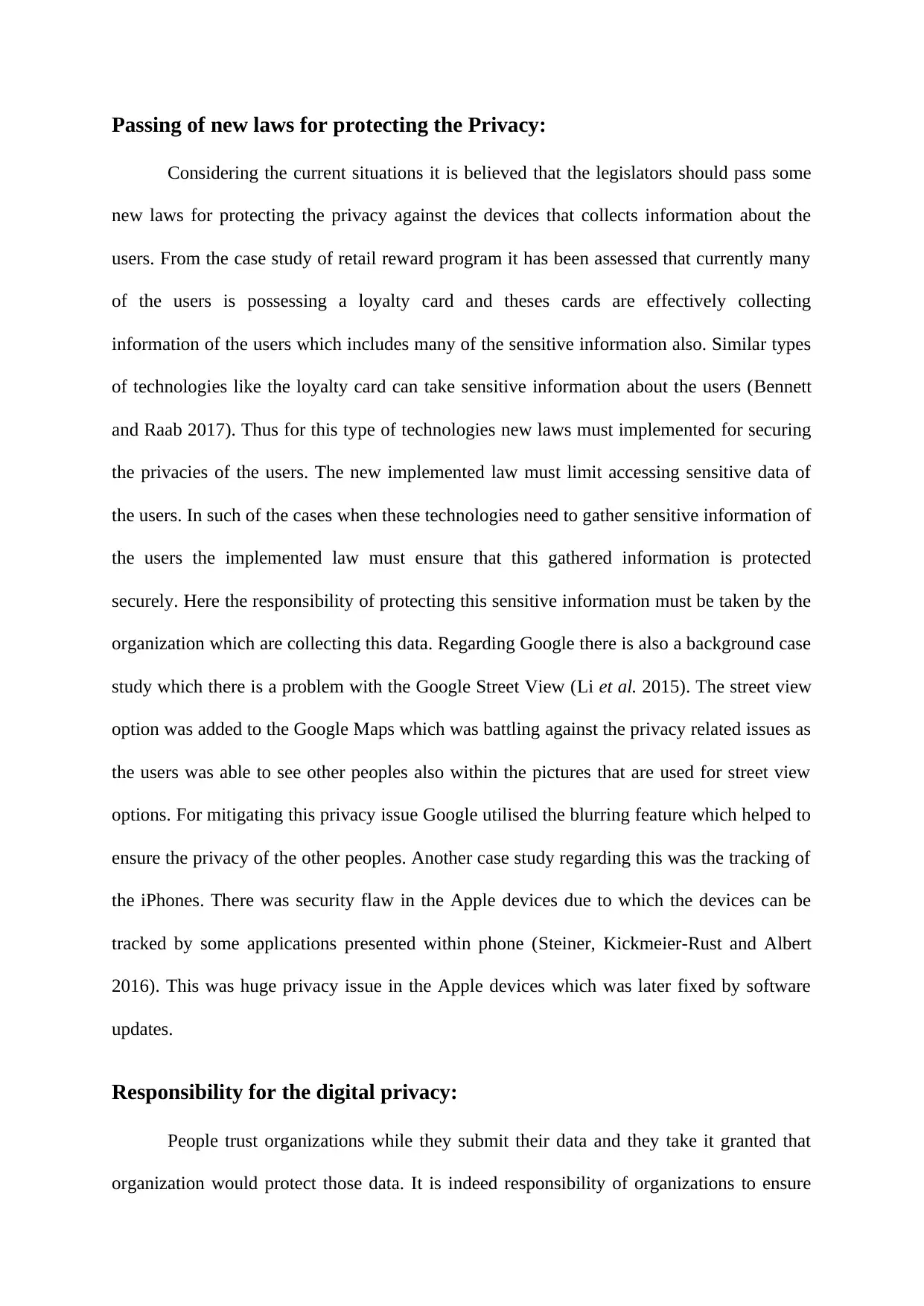
Passing of new laws for protecting the Privacy:
Considering the current situations it is believed that the legislators should pass some
new laws for protecting the privacy against the devices that collects information about the
users. From the case study of retail reward program it has been assessed that currently many
of the users is possessing a loyalty card and theses cards are effectively collecting
information of the users which includes many of the sensitive information also. Similar types
of technologies like the loyalty card can take sensitive information about the users (Bennett
and Raab 2017). Thus for this type of technologies new laws must implemented for securing
the privacies of the users. The new implemented law must limit accessing sensitive data of
the users. In such of the cases when these technologies need to gather sensitive information of
the users the implemented law must ensure that this gathered information is protected
securely. Here the responsibility of protecting this sensitive information must be taken by the
organization which are collecting this data. Regarding Google there is also a background case
study which there is a problem with the Google Street View (Li et al. 2015). The street view
option was added to the Google Maps which was battling against the privacy related issues as
the users was able to see other peoples also within the pictures that are used for street view
options. For mitigating this privacy issue Google utilised the blurring feature which helped to
ensure the privacy of the other peoples. Another case study regarding this was the tracking of
the iPhones. There was security flaw in the Apple devices due to which the devices can be
tracked by some applications presented within phone (Steiner, Kickmeier-Rust and Albert
2016). This was huge privacy issue in the Apple devices which was later fixed by software
updates.
Responsibility for the digital privacy:
People trust organizations while they submit their data and they take it granted that
organization would protect those data. It is indeed responsibility of organizations to ensure
Considering the current situations it is believed that the legislators should pass some
new laws for protecting the privacy against the devices that collects information about the
users. From the case study of retail reward program it has been assessed that currently many
of the users is possessing a loyalty card and theses cards are effectively collecting
information of the users which includes many of the sensitive information also. Similar types
of technologies like the loyalty card can take sensitive information about the users (Bennett
and Raab 2017). Thus for this type of technologies new laws must implemented for securing
the privacies of the users. The new implemented law must limit accessing sensitive data of
the users. In such of the cases when these technologies need to gather sensitive information of
the users the implemented law must ensure that this gathered information is protected
securely. Here the responsibility of protecting this sensitive information must be taken by the
organization which are collecting this data. Regarding Google there is also a background case
study which there is a problem with the Google Street View (Li et al. 2015). The street view
option was added to the Google Maps which was battling against the privacy related issues as
the users was able to see other peoples also within the pictures that are used for street view
options. For mitigating this privacy issue Google utilised the blurring feature which helped to
ensure the privacy of the other peoples. Another case study regarding this was the tracking of
the iPhones. There was security flaw in the Apple devices due to which the devices can be
tracked by some applications presented within phone (Steiner, Kickmeier-Rust and Albert
2016). This was huge privacy issue in the Apple devices which was later fixed by software
updates.
Responsibility for the digital privacy:
People trust organizations while they submit their data and they take it granted that
organization would protect those data. It is indeed responsibility of organizations to ensure
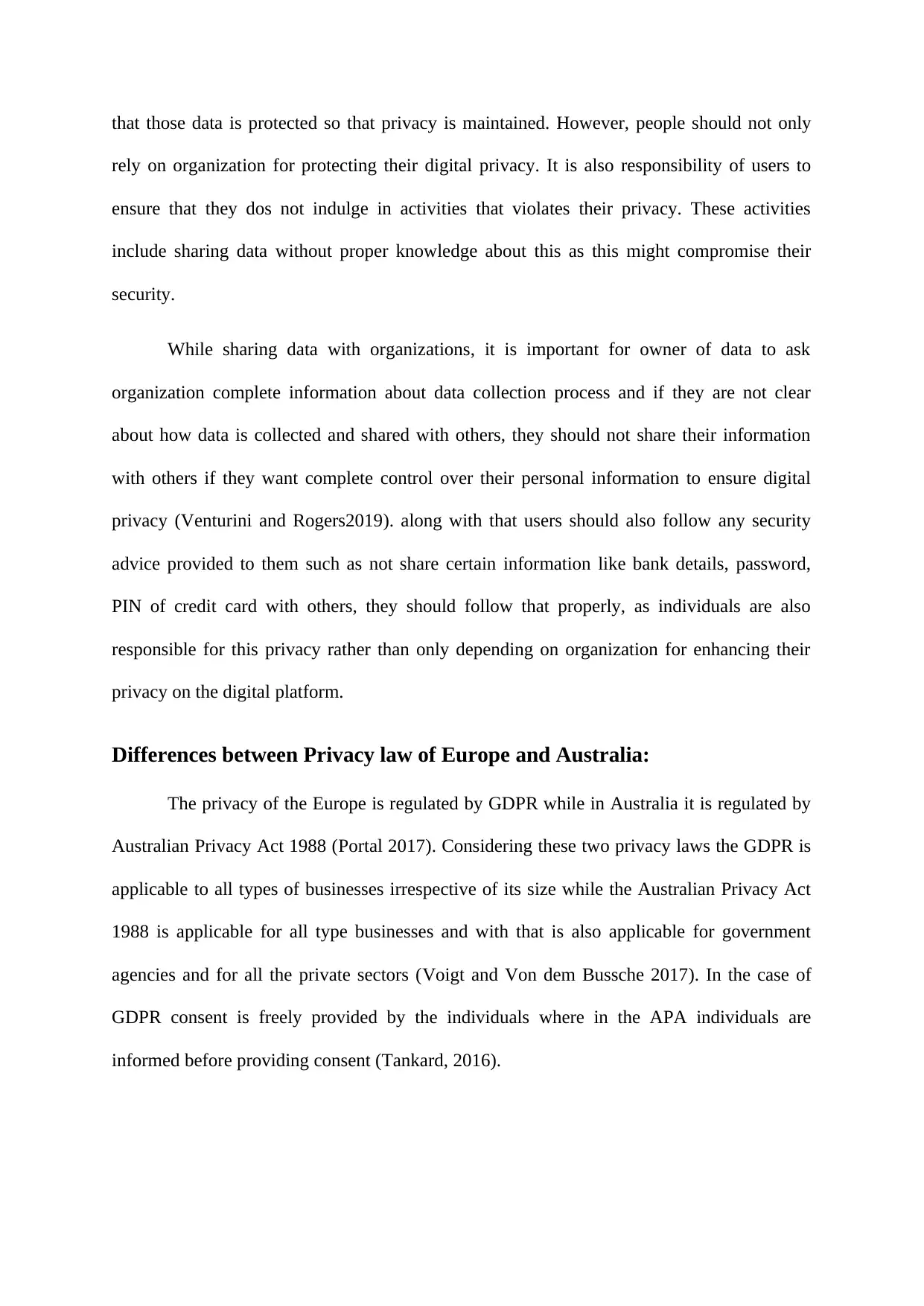
that those data is protected so that privacy is maintained. However, people should not only
rely on organization for protecting their digital privacy. It is also responsibility of users to
ensure that they dos not indulge in activities that violates their privacy. These activities
include sharing data without proper knowledge about this as this might compromise their
security.
While sharing data with organizations, it is important for owner of data to ask
organization complete information about data collection process and if they are not clear
about how data is collected and shared with others, they should not share their information
with others if they want complete control over their personal information to ensure digital
privacy (Venturini and Rogers2019). along with that users should also follow any security
advice provided to them such as not share certain information like bank details, password,
PIN of credit card with others, they should follow that properly, as individuals are also
responsible for this privacy rather than only depending on organization for enhancing their
privacy on the digital platform.
Differences between Privacy law of Europe and Australia:
The privacy of the Europe is regulated by GDPR while in Australia it is regulated by
Australian Privacy Act 1988 (Portal 2017). Considering these two privacy laws the GDPR is
applicable to all types of businesses irrespective of its size while the Australian Privacy Act
1988 is applicable for all type businesses and with that is also applicable for government
agencies and for all the private sectors (Voigt and Von dem Bussche 2017). In the case of
GDPR consent is freely provided by the individuals where in the APA individuals are
informed before providing consent (Tankard, 2016).
rely on organization for protecting their digital privacy. It is also responsibility of users to
ensure that they dos not indulge in activities that violates their privacy. These activities
include sharing data without proper knowledge about this as this might compromise their
security.
While sharing data with organizations, it is important for owner of data to ask
organization complete information about data collection process and if they are not clear
about how data is collected and shared with others, they should not share their information
with others if they want complete control over their personal information to ensure digital
privacy (Venturini and Rogers2019). along with that users should also follow any security
advice provided to them such as not share certain information like bank details, password,
PIN of credit card with others, they should follow that properly, as individuals are also
responsible for this privacy rather than only depending on organization for enhancing their
privacy on the digital platform.
Differences between Privacy law of Europe and Australia:
The privacy of the Europe is regulated by GDPR while in Australia it is regulated by
Australian Privacy Act 1988 (Portal 2017). Considering these two privacy laws the GDPR is
applicable to all types of businesses irrespective of its size while the Australian Privacy Act
1988 is applicable for all type businesses and with that is also applicable for government
agencies and for all the private sectors (Voigt and Von dem Bussche 2017). In the case of
GDPR consent is freely provided by the individuals where in the APA individuals are
informed before providing consent (Tankard, 2016).
⊘ This is a preview!⊘
Do you want full access?
Subscribe today to unlock all pages.

Trusted by 1+ million students worldwide
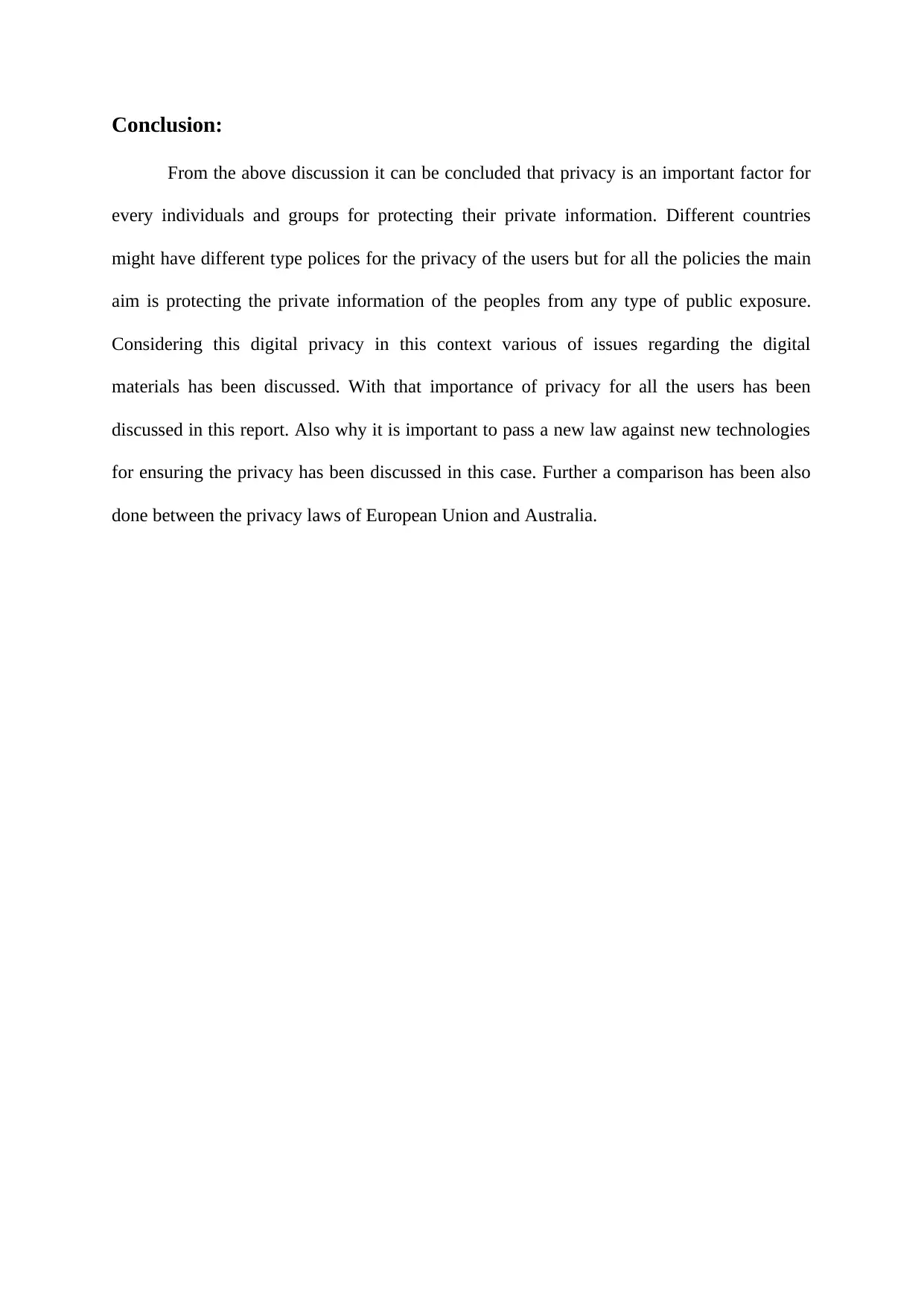
Conclusion:
From the above discussion it can be concluded that privacy is an important factor for
every individuals and groups for protecting their private information. Different countries
might have different type polices for the privacy of the users but for all the policies the main
aim is protecting the private information of the peoples from any type of public exposure.
Considering this digital privacy in this context various of issues regarding the digital
materials has been discussed. With that importance of privacy for all the users has been
discussed in this report. Also why it is important to pass a new law against new technologies
for ensuring the privacy has been discussed in this case. Further a comparison has been also
done between the privacy laws of European Union and Australia.
From the above discussion it can be concluded that privacy is an important factor for
every individuals and groups for protecting their private information. Different countries
might have different type polices for the privacy of the users but for all the policies the main
aim is protecting the private information of the peoples from any type of public exposure.
Considering this digital privacy in this context various of issues regarding the digital
materials has been discussed. With that importance of privacy for all the users has been
discussed in this report. Also why it is important to pass a new law against new technologies
for ensuring the privacy has been discussed in this case. Further a comparison has been also
done between the privacy laws of European Union and Australia.
Paraphrase This Document
Need a fresh take? Get an instant paraphrase of this document with our AI Paraphraser
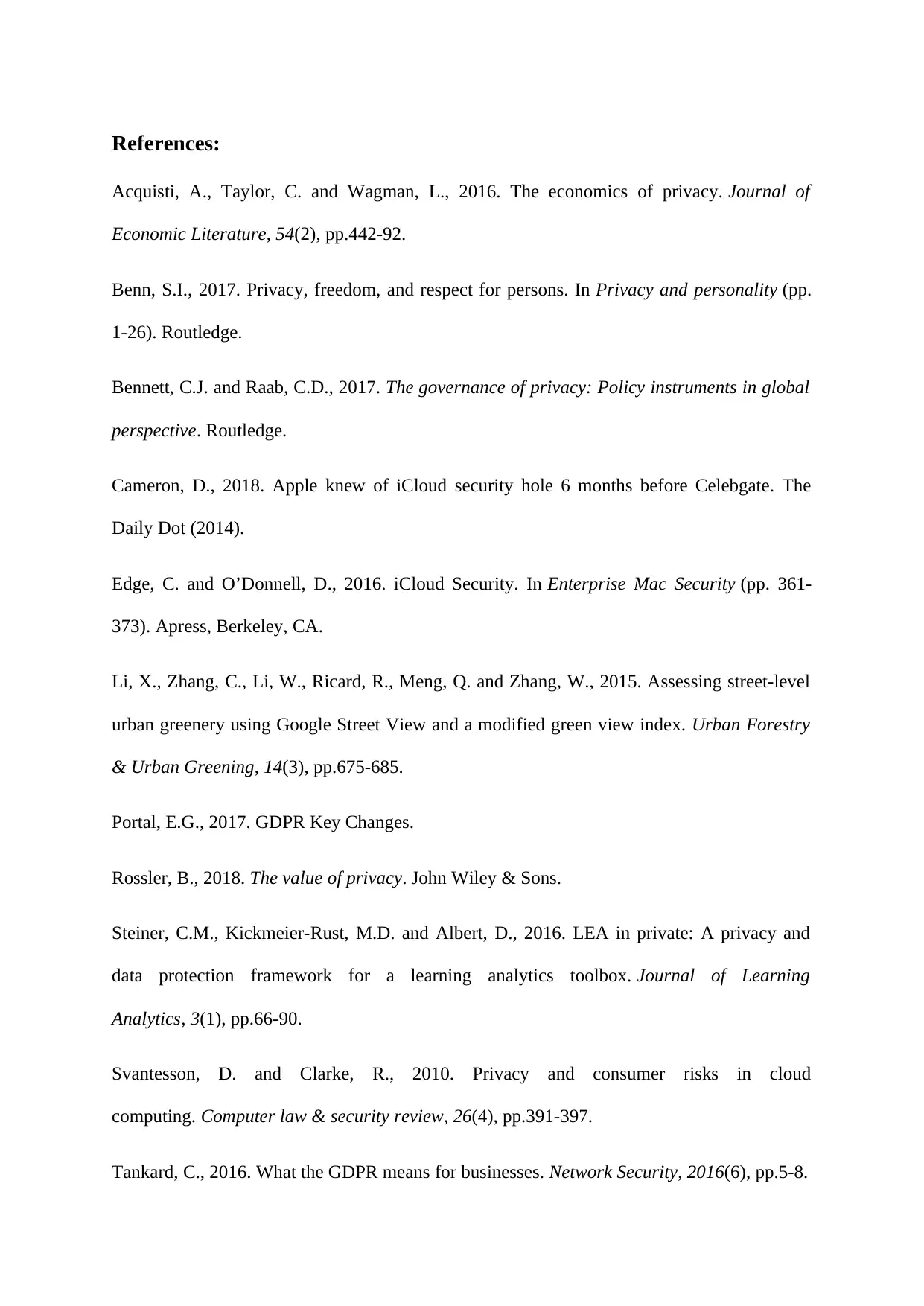
References:
Acquisti, A., Taylor, C. and Wagman, L., 2016. The economics of privacy. Journal of
Economic Literature, 54(2), pp.442-92.
Benn, S.I., 2017. Privacy, freedom, and respect for persons. In Privacy and personality (pp.
1-26). Routledge.
Bennett, C.J. and Raab, C.D., 2017. The governance of privacy: Policy instruments in global
perspective. Routledge.
Cameron, D., 2018. Apple knew of iCloud security hole 6 months before Celebgate. The
Daily Dot (2014).
Edge, C. and O’Donnell, D., 2016. iCloud Security. In Enterprise Mac Security (pp. 361-
373). Apress, Berkeley, CA.
Li, X., Zhang, C., Li, W., Ricard, R., Meng, Q. and Zhang, W., 2015. Assessing street-level
urban greenery using Google Street View and a modified green view index. Urban Forestry
& Urban Greening, 14(3), pp.675-685.
Portal, E.G., 2017. GDPR Key Changes.
Rossler, B., 2018. The value of privacy. John Wiley & Sons.
Steiner, C.M., Kickmeier-Rust, M.D. and Albert, D., 2016. LEA in private: A privacy and
data protection framework for a learning analytics toolbox. Journal of Learning
Analytics, 3(1), pp.66-90.
Svantesson, D. and Clarke, R., 2010. Privacy and consumer risks in cloud
computing. Computer law & security review, 26(4), pp.391-397.
Tankard, C., 2016. What the GDPR means for businesses. Network Security, 2016(6), pp.5-8.
Acquisti, A., Taylor, C. and Wagman, L., 2016. The economics of privacy. Journal of
Economic Literature, 54(2), pp.442-92.
Benn, S.I., 2017. Privacy, freedom, and respect for persons. In Privacy and personality (pp.
1-26). Routledge.
Bennett, C.J. and Raab, C.D., 2017. The governance of privacy: Policy instruments in global
perspective. Routledge.
Cameron, D., 2018. Apple knew of iCloud security hole 6 months before Celebgate. The
Daily Dot (2014).
Edge, C. and O’Donnell, D., 2016. iCloud Security. In Enterprise Mac Security (pp. 361-
373). Apress, Berkeley, CA.
Li, X., Zhang, C., Li, W., Ricard, R., Meng, Q. and Zhang, W., 2015. Assessing street-level
urban greenery using Google Street View and a modified green view index. Urban Forestry
& Urban Greening, 14(3), pp.675-685.
Portal, E.G., 2017. GDPR Key Changes.
Rossler, B., 2018. The value of privacy. John Wiley & Sons.
Steiner, C.M., Kickmeier-Rust, M.D. and Albert, D., 2016. LEA in private: A privacy and
data protection framework for a learning analytics toolbox. Journal of Learning
Analytics, 3(1), pp.66-90.
Svantesson, D. and Clarke, R., 2010. Privacy and consumer risks in cloud
computing. Computer law & security review, 26(4), pp.391-397.
Tankard, C., 2016. What the GDPR means for businesses. Network Security, 2016(6), pp.5-8.

Venturini, T. and Rogers, R., 2019. “API-Based Research” or How can Digital Sociology and
Journalism Studies Learn from the Facebook and Cambridge Analytica Data Breach. Digital
Journalism, pp.1-9.
Voigt, P. and Von dem Bussche, A., 2017. The EU General Data Protection Regulation
(GDPR). A Practical Guide, 1st Ed., Cham: Springer International Publishing.
Warren, S. and Brandeis, L., 2019. The right to privacy. Litres.
Journalism Studies Learn from the Facebook and Cambridge Analytica Data Breach. Digital
Journalism, pp.1-9.
Voigt, P. and Von dem Bussche, A., 2017. The EU General Data Protection Regulation
(GDPR). A Practical Guide, 1st Ed., Cham: Springer International Publishing.
Warren, S. and Brandeis, L., 2019. The right to privacy. Litres.
⊘ This is a preview!⊘
Do you want full access?
Subscribe today to unlock all pages.

Trusted by 1+ million students worldwide
1 out of 9
Related Documents
Your All-in-One AI-Powered Toolkit for Academic Success.
+13062052269
info@desklib.com
Available 24*7 on WhatsApp / Email
![[object Object]](/_next/static/media/star-bottom.7253800d.svg)
Unlock your academic potential
Copyright © 2020–2025 A2Z Services. All Rights Reserved. Developed and managed by ZUCOL.

![NIT2201 - Online Privacy: An Analytical Essay - [University Name]](/_next/image/?url=https%3A%2F%2Fdesklib.com%2Fmedia%2Fimages%2Fgc%2F0656cbdd520f46bb97c676d8d876831a.jpg&w=256&q=75)



